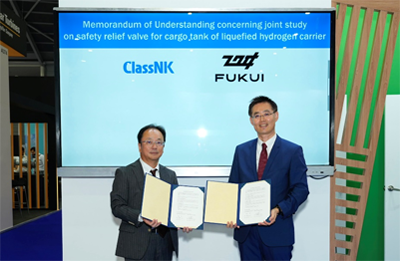Fukui Seisakusho Co., Ltd. (FUKUI) and ClassNK have signed a Memorandum of Understanding concerning a joint study on a safety relief valve for a cargo tank of liquefied hydrogen carriers at the “Gastech2023” held in Singapore.

To combat global warming, attention is growing towards hydrogen as an energy source that does not emit CO2 at the point of use. The realization of a hydrogen-based society necessitates the establishment of a secure and efficient supply chain that distributes hydrogen produced in an environmentally friendly manner to consumption areas. As the measure to transport large volumes of hydrogen over long distances efficiently, carrying liquefied hydrogen via ships are considered promising, spurring ongoing advancements in related technologies.
In order to ensure safety in the transport of liquefied hydrogen, the development of safety relief valves that can handle hydrogen’s characteristics including extremely low temperatures, ease of leakage, and hydrogen embrittlement, which leads to a decrease in material strength and toughness, is necessary. Appropriate safety standards are also required. As part of the efforts to establish key technologies for hydrogen transport, FUKUI and ClassNK have agreed to jointly conduct a study for the installation of safety relief valves for cargo tanks of liquefied hydrogen carriers on actual ships.
Yo Fukui, President and CEO, FUKUI said, “FUKUI aims to be a leading company in ensuring the safety of customers’ equipment for realization of a decarbonized society worldwide. For the hydrogen supply chain, it is crucial to have the commitment and the ability to execute to overcome various challenges such as extremely low temperatures and hydrogen embrittlement. I’m convinced that the MOU signed today with ClassNK will be a significant step towards achieving a sustainable society.”
Hayato Suga, Executive Vice President, ClassNK said, “ClassNK is pleased to launch a new partnership with FUKUI, dedicated to decarbonizing society. Through our extensive experience with liquefied hydrogen carriers, we will apply our expertise to advance the development and standard relevant to the technology, thereby supporting the global adoption of liquified hydrogen carriers.”


